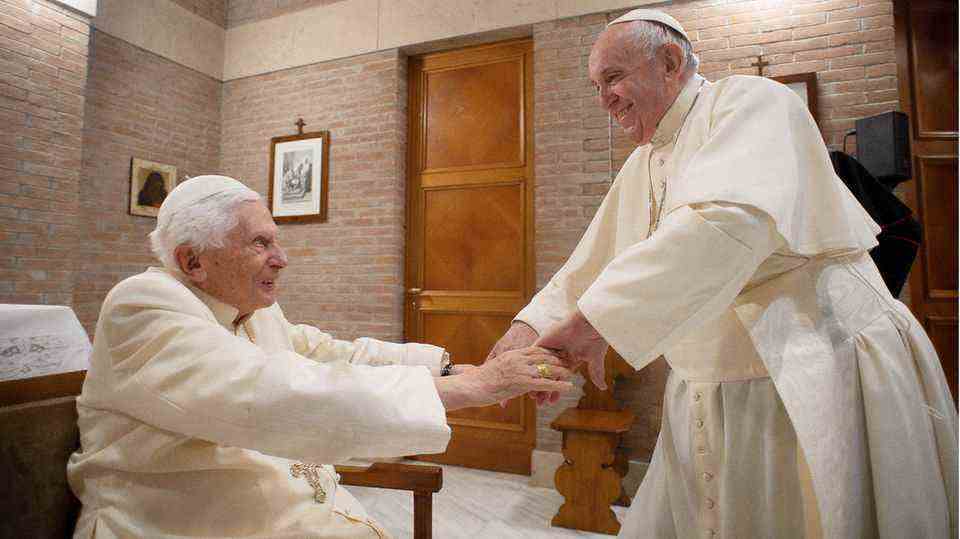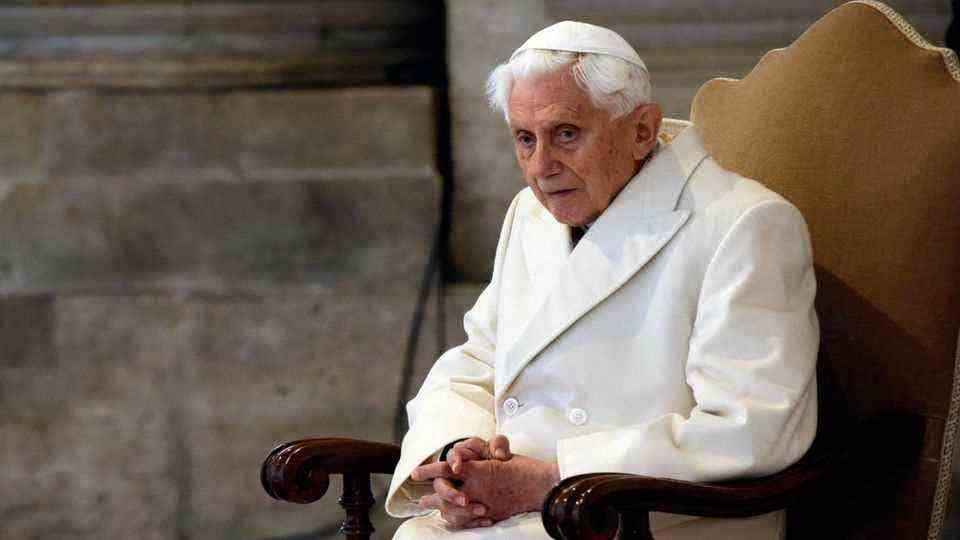TV review
“Anne Will” to the Catholic Church
A lot of humility, few guarantees – and a clear message to Pope Benedict
“System failure of the Church”: Georg Bätzing, Bishop of Limburg and Chairman of the German Bishops’ Conference
© NDR/Wolfgang Borrs
Anne Will discusses the recent abuse scandal in the Catholic Church. Many in the group are calling for Cardinal Marx to resign. The church does not promise adequate compensation for the victims.
By Jan Zier
It was as certain as the famous Amen in church – in times of the pandemic – that Anne Will on Sunday is about those, about Corona, vaccination, infection control measures and so on. Now, however, an independent legal report has revealed evidence of at least 497 victims of abuse in the Archdiocese of Munich and Freising between 1945 and 2019. 235 perpetrators were identified in the study, including 173 Catholic priests. Even Anne Will is alarmed: “Abuse, lies, cover-ups – can this church still be saved?”
Who discussed?
- Georg Bätzing, Bishop of Limburg and Chairman of the German Bishops’ Conference
- Matthew Katsch, co-founder and speaker of the “Eckiger Tisch” initiative for those affected
- Katrin Goering-Eckardt (Bündnis 90 / Die Grünen), Vice President of the Bundestag
- Ingrid Matthäus-Maier (SPD), Bundestag Vice President
- Christiane Florin, politician and lawyer; Editor for religion and society at Deutschlandfunk
How did the discussion go?
The debate begins once again with what Christiane Florin calls “humility gigantism”. Bishop Bätzing, the highest Catholic in the country by office, speaks of a “system failure of the church”, of “institutional failure”, of an “immense damage” that cannot be repaired. He advises the emeritus Pope Benedict XVI, who has just been convicted of lying, to disregard his advisors and say: “I have taken the blame on myself. I beg your forgiveness.” The Catholic Church still believes in miracles.
At the presentation of the report, the lawyers at the Munich law firm Westpfahl Spilker Wastl spoke of a “horrifying balance sheet”. They proved that those responsible in the archdiocese had violated numerous disclosure obligations and the protection of criminals who had been convicted. The allegations are directed not only against Joseph Ratzinger, but also against the incumbent Archbishop Reinhard Marx. “We see a disaster,” said Marx – but he did not want to resign. This is exactly what Matthias Katsch, the spokesman for the “Eckiger Tisch” initiative for those affected, is now demanding of him – although he concedes that Marx is “honestly affected” and although he is also clear: “The exchange of people changes nothing”. Katsch even calls for a “system change” without it being quite clear what that should consist of.
Christiane Florin also complains that all those responsible in the Catholic Church are still in office and dignified, although the systematic abuse within the Church has been discussed since 2010. In addition to the resignation of those responsible, church critic Ingrid Matthäus-Maier also – and above all – calls for the perpetrators to be banned from their profession, for all archives to be opened, and for investigations by secular public prosecutors to be carried out against all those perpetrators who are still alive. She criticizes the “rhetoric of dismay” of the clergy and the “camaraderie” of politicians with the Christian churches in the country. Only 41 cases from the Archdiocese of Munich and Freising have now been handed over to the public prosecutor, says Matthäus-Maier – and that too anonymously. “All acts must be relentlessly cleared up,” says Bätzing, who emphasizes that there are indeed consequences that would be drawn.
Katrin Göring-Eckardt, who demands from the church leaders that they should “make room for other structures”, is now campaigning for an independent investigation of the abuse cases in the Bundestag. Bätzing is also in favor of it – “of course”. So far, the church has always been “in control” of all the work to come to terms with it, says Florin, who attests to the “bite inhibitions” of politics; After all, the churches do a lot of social work that the state would otherwise have to do, so politicians don’t want to mess with the churches too much.
“Politics have failed,” says Matthäus-Maier – with a view to church labor law that allows Catholics to discriminate against women or queer people in the name of religious freedom and self-determination. The traffic light coalition now wants to “examine” reforms in church labor law “together with the churches”. Politically, that is the weakest possible statement, and the Greens Göring-Eckardt, unlike Matthäus-Maier, only wants to “change it, not abolish it”.
Bätzing says he cannot guarantee that queer people like the 125 who have just come out to the media will not be fired from his church – but he wants to guarantee that. He even goes so far as to say that he is “very happy” about the outing. Although his church continues to brand homosexuality as a sin. So can he give guarantees for queer employees in the official church? Katsch reminds him that even the German Bishops’ Conference cannot ignore the teachings of the Church in Rome. In his closing remarks, he once again calls for “appropriate compensation payments” for the victims of church abuse. And at this point Bätzing does not want to give any guarantees.
The special moment
In the late autumn of last year, Christiane Florin herself had an appointment to leave the church, but at the same time a Catholic priest was also tried in court – she then decided on the latter appointment, she says. She still hasn’t left the church: “I’m running away forever.”
The findings
In 2020, the Catholic Church received around 6.45 billion euros and the Evangelical Church around 5.63 billion euros from church tax, says the Federal Statistical Office. In addition, there are 548 million euros in state payments – a compensation for secularization in the 19th century – since the Second World War, 22 billion euros have been paid by the state to the churches, says Matthäus-Maier. “These state services can no longer be made understandable,” says Bätzing. The traffic light government has decided to change something about these payments – together with the churches.
Conclusion
Can the Catholic Church still be saved? In the end, this question remains open. But maybe it was just a rhetorical one anyway.



